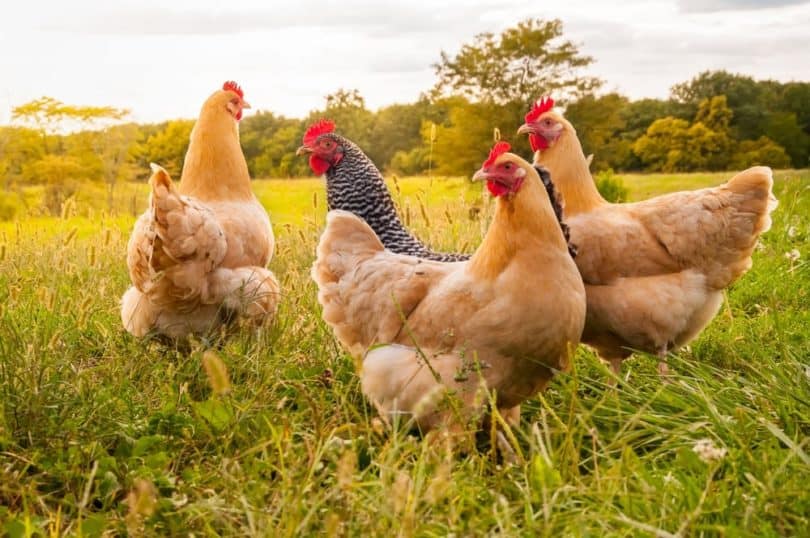Approved by Dr. Luqman Javed
If you own chickens, you know that keeping them safe is a top priority, but many people don’t realize how many predators can put the life of your birds in danger. We see many of these animals every day and don’t even realize the threat they pose.
We’ll tell you a little about some animals that may hunt chickens and give you some tips on keeping them away from your coop. Keep reading while we discuss dangerous animals and the methods you can employ to keep them off your property.

The 13 Common Chicken Predators
1. Dogs
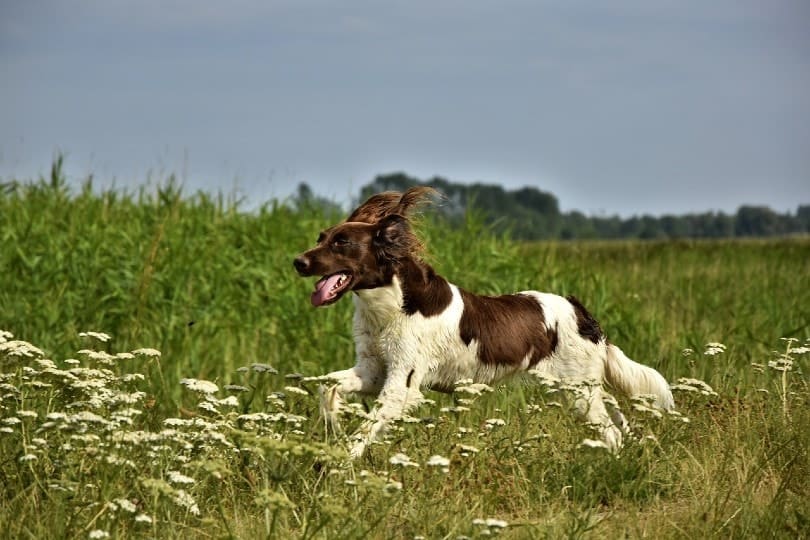
Dogs are one of the most popular animals in America, and most of us see at least one every day, so it’s a great place to start. While dogs are man’s best friend, many breeds will chase after smaller animals like the chicken. Terriers and hounds, in particular, will have a difficult time peacefully walking past your coop without barking and jumping at the fence.
How Can I Protect My Flock?
The best way to protect your flock from dogs is to build a fence around your coop that stands at least 6 feet tall. Most dogs will respect a 6-foot barrier, so your chickens should be safe.
A tall fence isn’t guaranteed to stop all dogs; therefore, it’s best to have your chickens in a mobile coop for their own safety. This lets them explore the outdoors without risk of an attack. Livestock-protecting dog breeds can also be adopted to protect your flock from other animals, including predatory dogs.
2. Cats
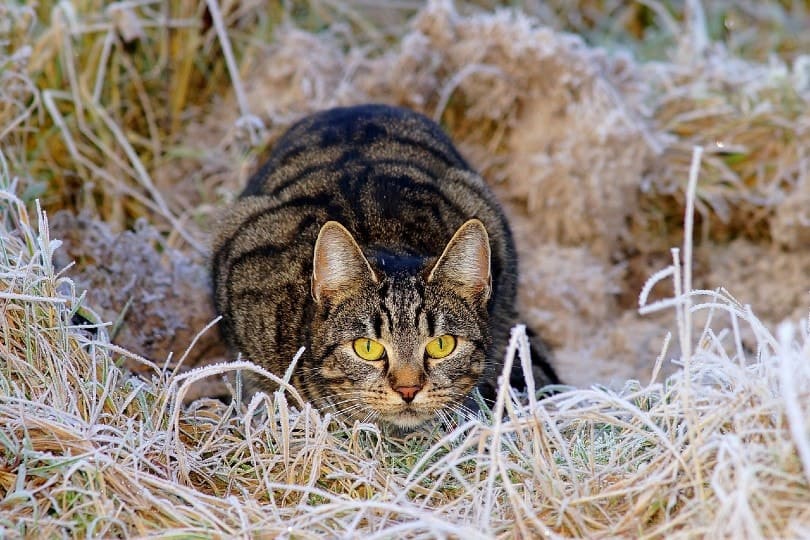
Like dogs, cats are extremely popular pets, and most of us know at least one person that has one. Unfortunately, there are also quite a few feral cats living in any city, and you will even find them in rural areas. Cats are able to kill chickens and their young.
How Can I Protect My Flock?
Though a fence seems like a logical starting point and is always good to have around, cats are experts at climbing and won’t be deterred by a fence alone. Much like when dealing with dogs, a mobile coop is your best bet to keep your flock safe from cats.
3. Foxes
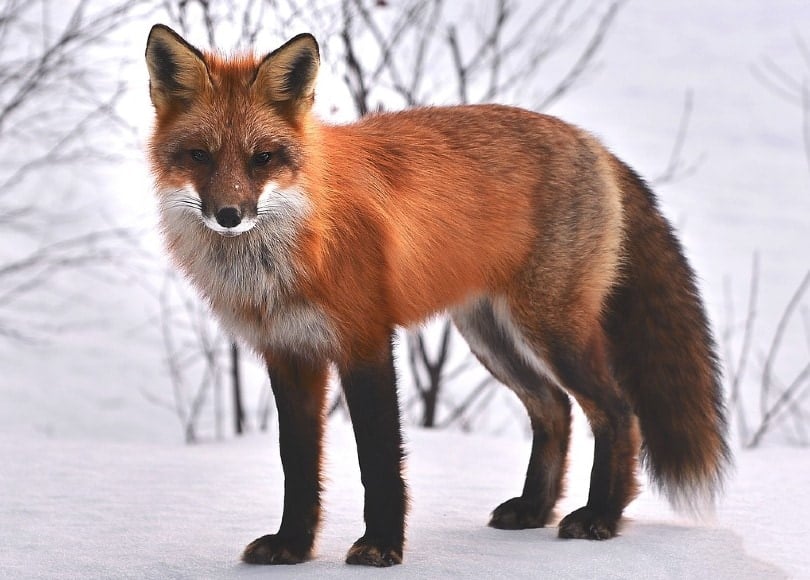
The fox is one of the most common chicken predators, and these animals are extremely clever. A fox can dig and chew through wires and will likely find a way around any fence you install. These animals will enter the coop and kill your chickens if the opportunity ever presents itself. Foxes readily kill multiple chickens at once and then carry them back to their dens to stash them. Therefore, a single fox incident can lead to the loss of multiple birds.
How Can I Protect My Flock?
Foxes are not the best climbers, and a 6-foot fence (that slopes outwards) is a good deterrent. However, they can eventually find their way through or under a fence by digging around, and therefore, the best way to protect your flock is to stay vigilant about patrolling the perimeter of the fence, looking for signs of tampering, and repairing it immediately.
Since foxes often move under cover of the night, you can employ technology to set your coop to open and close at specific times so you can lock the chickens inside at night. You will also need to regularly check the coop for signs of wear that could form an entry point.
4. Raccoons
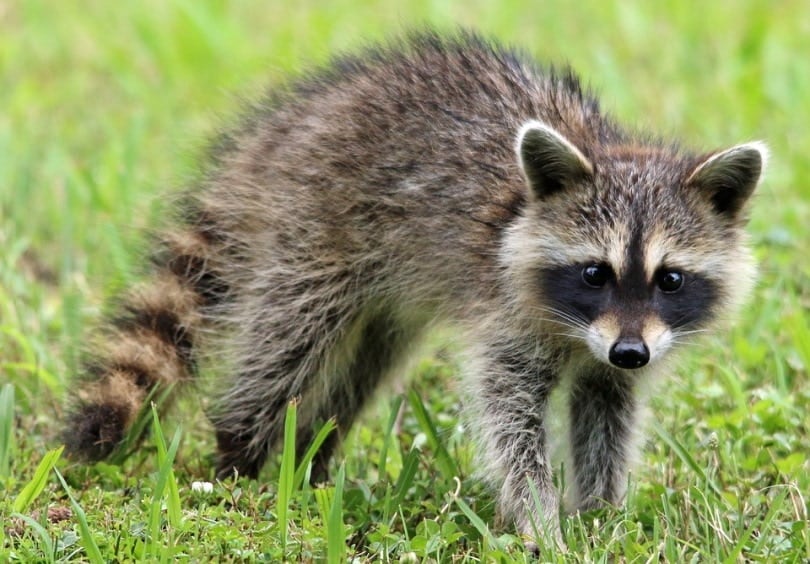
The raccoon is another primarily nocturnal animal that you can find in some regions, such as North America. Raccoons may break into the coop to feed on the eggs and baby chicks but will occasionally kill the adult birds as well. Racoons are notoriously crafty at undoing simple latches and hooks and can gain entry into a coop that doesn’t have a secure lock.
How Can I Protect My Flock?
The best defense against a raccoon is a coop that automatically shuts tight at a certain time and doesn’t open again until the next day. You will also need to regularly inspect the coop to look for signs of an opening that a predator can exploit.
5. Bears
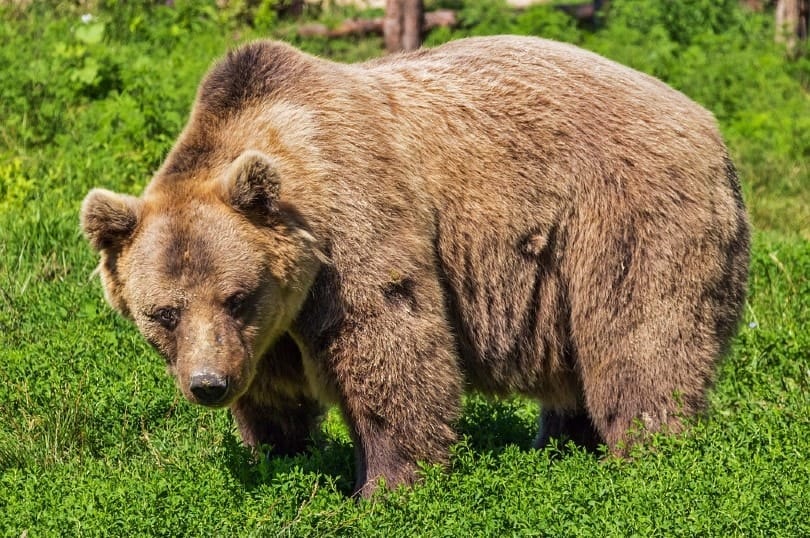
Bears can be a danger to your chickens, especially in spring when they wake up hungry. Bears are not technically after your chickens but are more likely looking for their feed. They can, however, make a meal out of chickens. However, the bear can get quite destructive trying to get the feed and may kill some birds.
How Can I Protect My Flock?
The best way to minimize the danger of bears coming onto your property is to keep the feed tightly closed and locked, so you don’t attract any with the feed’s scent. In addition, having secure fencing and being on the lookout for reports of bears in public places will help you remain vigilant. Contact local wildlife authorities if you suspect the presence of a bear in your neighborhood.
6. Coyote
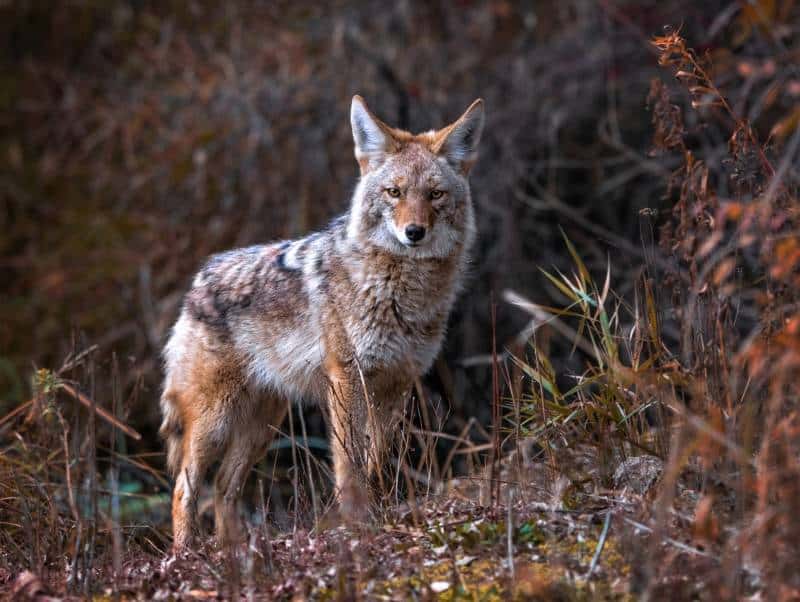
The coyote is an animal that is similar to the wolf but slightly smaller. This nocturnal animal is extremely dangerous to chickens and humans alike. It will usually kill and eat the chicken on the spot if it catches one.
How Can I Protect My Flock?
Fencing can help keep coyotes off your property, but the best way to protect the chickens is to have an automatically locking coop that secures your chickens at night and lets them out in the morning.
7. Mountain Lion
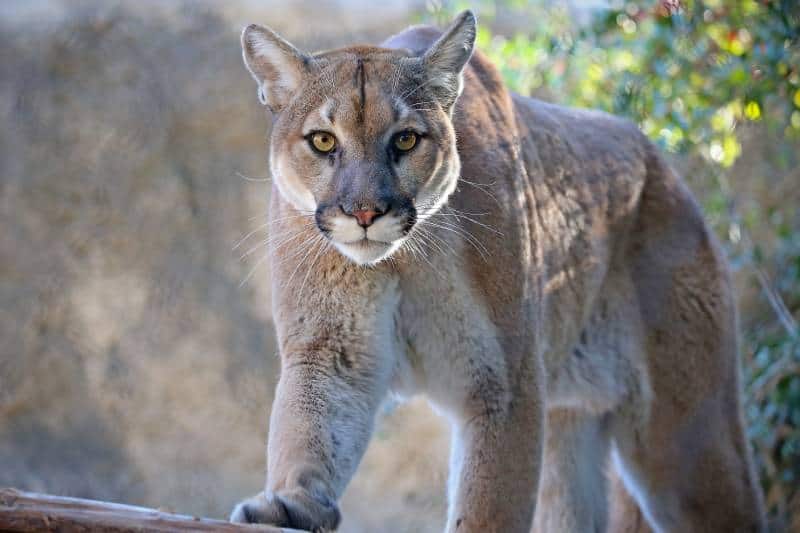
Mountain lions are a considerable threat to all livestock, including chickens, in North America. They prefer to hunt at night and will attack via ambushing their prey.
How Can I Protect My Flock?
Much like feral cats, a fence won’t be much of a hurdle for a mountain lion. However, the best defense is to keep the coop locked at night when most mountain lions are actively hunting. Contact your local wildlife authorities if you suspect a mountain lion roaming public places.
8. Hawks
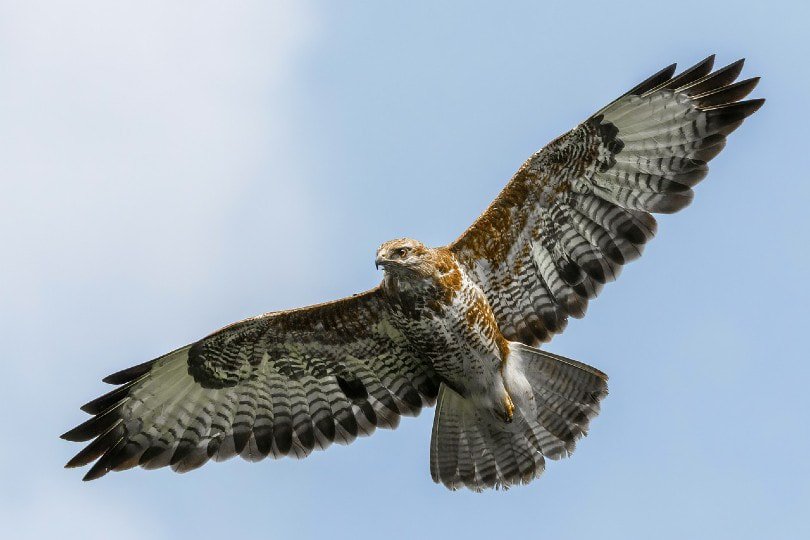
Unfortunately, birds of prey like the hawk pose an extreme danger to your chickens, and there is little you can do to protect them. The hawk is a daytime hunter that will stalk your birds as they are out of the coop and scratching for seeds.
How Can I Protect My Flock?
Because hawks are an aerial threat, the best option to safeguard your flock from their attacks is the use of covered coops. Livestock protection dogs might also deter hawks but do not guarantee the safety of your flock if the hawk approaches from an unexpected angle.
9. Owls
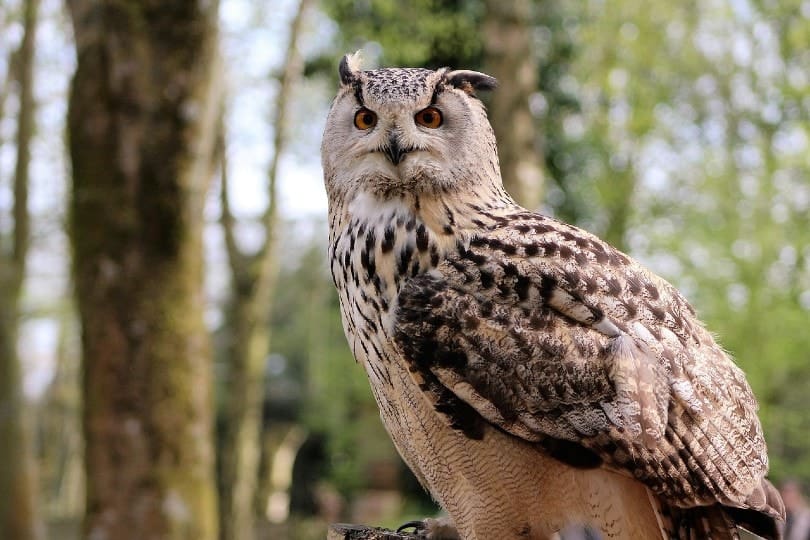
Owls are another bird of prey that can be extremely dangerous to a chicken. However, unlike the hawk, these birds are primarily night hunters. Still, they may at times hunt during the day as well.
How Can I Protect My Flock?
Much like hawks, the best option to safeguard your flock from owl attacks is the use of covered coops and guard animals (such as a dog).
10. Skunks
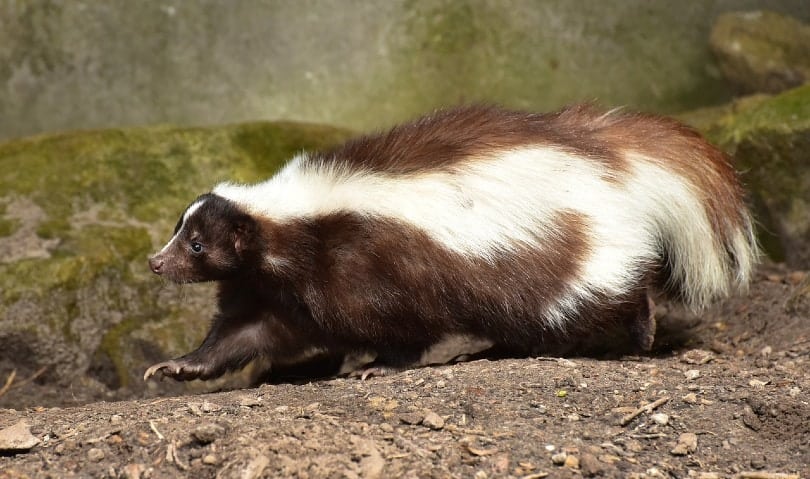
Skunks are best known for their spraying antics, but they can also cause considerable damage to your pen and coop as they attempt to get at your chickens’ eggs, and may even kill a chicken when doing so.
Skunks dig, so they will create holes that other animals can use to gain access to the coop, and they also like to nest in any shelter they can find near or under the coop where they can get repeated access to the eggs. You can usually tell when a skunk is an invader because they often leave broken eggshells behind.
How Can I Protect My Flock?
Keep the pen and nearby area free of any objects that the skunk might use for cover. Once again, a secure coop is your best bet to safeguard your flock. A guard dog is also an effective way to convince a skunk to go somewhere else.
11. Opossum
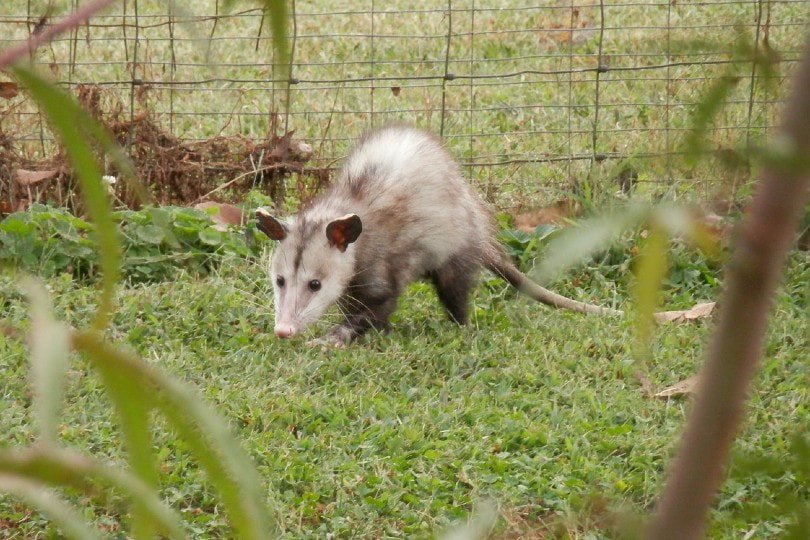
The opossum is a night animal that will try to break into your coop to steal eggs and eat baby chicks. It may also kill the adult chickens by biting them on the neck.
How Can I Protect My Flock?
The best way to protect your coop from opossums is to make sure there are no holes in the structure and a secure coop that you lock up at night.
12. Weasels

Weasels look a lot like ferrets. These animals can get through tiny spaces and will usually climb right through your chain link fence and enter your coop through any hole that is more than 2 inches wide. Though they usually eat eggs, they can hunt chicks and adult chickens as well.
How Can I Protect My Flock?
Once again, since weasels usually hunt at night, the best defense is a locking coop without any holes in it. Ensure that all ventilation areas have heavy screening to protect them from weasels. Inspect your coop regularly for damage or new holes and repair it immediately.
13. Snakes
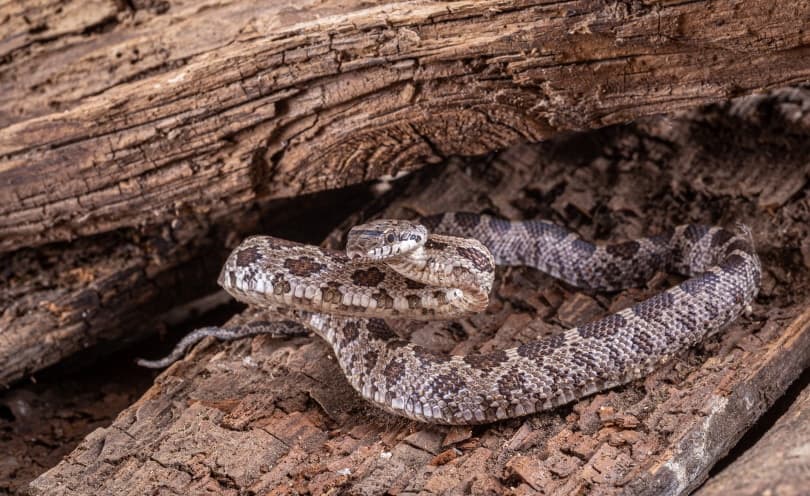
Snakes are not only dangerous for your chickens; the poisonous ones can also bite you while you are tending the cage. Snakes can easily circumvent many of the security measures you put in place and usually look to get the chicken eggs.
How Can I Protect My Flock?
The best way to prevent snakes from gaining access to your coop is to inspect it regularly for any holes and repair them immediately. You will need to keep the area free of objects the snake might use for shelter, and you will want to keep the grass trimmed.

Final Thoughts
As you can see, there are plenty of predators that would love to eat your chickens or their eggs, but it’s not that difficult to provide a reasonable amount of safety. A good chain link fence is a great start and will allow you to see what’s going on inside while keeping out most animals.
We hope you have enjoyed reading this article, learned about a few new predators to look out for, as well as learned some new tricks to keep them away. If we have helped create a safer environment for your birds, please share these 13 chicken predators and how to protect your flock from them on Facebook and Twitter.
- You may also be interested in: How To Keep Hawks Away From Chickens (8 Tips)
Featured Image Credit: Moonborne, Shutterstock
